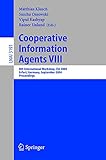Cooperative Information Agents VIII [electronic resource] : 8th International Workshop, CIA 2004, Erfurt, Germany, September 27-29, 2004. Proceedings / edited by Matthias Klusch, Sascha Ossowski, Vipul Kashyap, Rainer Unland.
Material type: TextSeries: Lecture Notes in Computer Science ; 3191Publisher: Berlin, Heidelberg : Springer Berlin Heidelberg, 2004Description: XII, 312 p. online resourceContent type: text Media type: computer Carrier type: online resourceISBN: 9783540301042Subject(s): Computer science | Computer Communication Networks | Database management | Information storage and retrieval systems | Information systems | Artificial intelligence | Computer Science | Artificial Intelligence (incl. Robotics) | Information Systems Applications (incl.Internet) | Information Storage and Retrieval | Database Management | Computer Communication Networks | User Interfaces and Human Computer InteractionAdditional physical formats: Printed edition:: No titleDDC classification: 006.3 LOC classification: Q334-342TJ210.2-211.495Online resources: Click here to access online
TextSeries: Lecture Notes in Computer Science ; 3191Publisher: Berlin, Heidelberg : Springer Berlin Heidelberg, 2004Description: XII, 312 p. online resourceContent type: text Media type: computer Carrier type: online resourceISBN: 9783540301042Subject(s): Computer science | Computer Communication Networks | Database management | Information storage and retrieval systems | Information systems | Artificial intelligence | Computer Science | Artificial Intelligence (incl. Robotics) | Information Systems Applications (incl.Internet) | Information Storage and Retrieval | Database Management | Computer Communication Networks | User Interfaces and Human Computer InteractionAdditional physical formats: Printed edition:: No titleDDC classification: 006.3 LOC classification: Q334-342TJ210.2-211.495Online resources: Click here to access online  E-BOOKS
E-BOOKS
| Current library | Home library | Call number | Materials specified | URL | Status | Date due | Barcode |
|---|---|---|---|---|---|---|---|
| IMSc Library | IMSc Library | Link to resource | Available | EBK3336 |
Invited Contributions -- Multi-agent Systems and Distributed Data Mining -- Society-Centered Design for Socially Embedded Multiagent Systems -- Agents and OWL-S -- Information Agents and P2P Computing -- Design and Implementation of Agent Community Based Peer-to-Peer Information Retrieval Method -- Towards Monitoring of Group Interactions and Social Roles via Overhearing -- A Probabilistic Approach to Predict Peers’ Performance in P2P Networks -- Personalizing Information Retrieval with Multi-agent Systems -- Issues of Communication -- On the Impact of Agent Communication Languages on the Implementation of Agent Systems -- Reasoning About Communication – A Practical Approach Based on Empirical Semantics -- The Evolution of Probabilistic Reciprocity in a Multi-agent Environment with Neighborhoods -- Recommender Agents -- Collaboration Analysis in Recommender Systems Using Social Networks -- Qualitative Analysis of User-Based and Item-Based Prediction Algorithms for Recommendation Agents -- Information Agents and Mobile Computing -- Agents that Coordinate Devices, Services, and Humans in Ubiquitous Computing -- Multi-agent Technology as an enabler of Computer Supported Cooperative Work for the Mobile Workforce -- A-Globe: Agent Platform with Inaccessibility and Mobility Support -- Industrial Applications -- Supply Chain Management using Multi-agent System -- An Agent Simulation Model for the Québec Forest Supply Chain -- Performance Analysis Of Multiagent Industrial System -- Cooperation in Open Environments -- The RoleX Environment for Multi-agent Cooperation -- Auction Equilibrium Strategies for Task Allocation in Uncertain Environments -- Agent’s Multiple Inquiries for Enhancing the Partnership Formation Process.
These are the proceedings of the 8th International Workshop on Cooperative Information Agents (CIA 2004), held at the Fair and Congress Center in - furt, Germany, September 27–29, 2004. It was part of the multi-conference Net. ObjectDays 2004, and, in particular, was co-located with the 2nd German Conference on Multiagent Systems Technologies (MATES 2004). In today’s networked world of linked heterogeneous, pervasive computer systems, devices, and information landscapes, the intelligent coordination and provision of relevant added-value information at any time, anywhere, by means of cooperative information agents becomes increasingly important for a variety of applications. An information agent is a computational software entity that has access to one or multiple, heterogeneous, and geographically dispersed data and information sources. It proactively searches for and maintains information on behalf of its human users, or other agents, preferably just in time. In other words,itismanagingandovercomingthedi?cultiesassociatedwithinformation overload in open, pervasive information and service landscapes. Cooperative - formation agents may collaborate with each other to accomplish both individual and shared joint goals depending on the actual preferences of their users, b- getary constraints, and resources available. One major challenge of developing agent-based intelligent information systems in open environments is to balance the autonomy of networked data, information, and knowledge sources with the potential payo? of leveraging them using information agents. Interdisciplinaryresearchanddevelopmentofinformationagentsrequires- pertise in relevant domains of information retrieval, arti?cial intelligence, database systems, human-computer interaction, and Internet and Web techn- ogy.


There are no comments on this title.